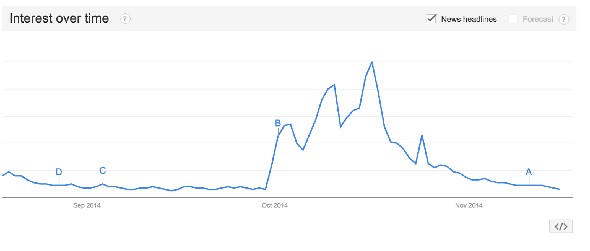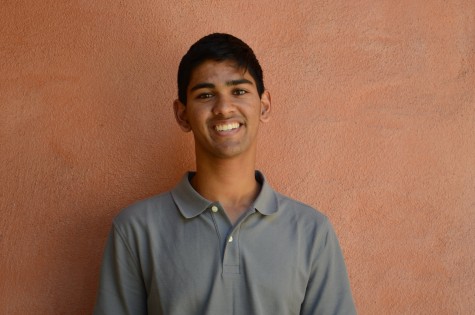Ebola: Has the fear subsided?

Usage of “Ebola” over time.
The U.S. was declared Ebola-free on Monday following the death of the only remaining Ebola patient in the country.
So far, the U.S. has confirmed 10 cases of EVD and, of these cases, there have been two deaths. Confirmed cases of Ebola include those of Dr. Craig Spencer, who was released from his quarantine in New York on Nov. 11, and of Dr. Martin Salia, who died of Ebola on Nov. 17. Salia, a Nebraska resident who had been working in Sierra Leone, his native country, tested positive for the disease on Nov. 10. According to the USA Today on Nov. 17, he was admitted to a specialized biocontainment unit in Nebraska on Nov. 15 and died 36 hours later of cardiac arrest. Since Dr. Salia’s death, the U.S. has been deemed free of EVD.
For a global comparison, the Centers for Disease Control (CDC) reported on Nov. 16 that Guinea, Liberia, and Sierra Leone remain the nations with the most severe Ebola virus disease (EVD) outbreaks. In these three nations alone, Ebola has caused over 5,400 deaths out of about 9,400 laboratory-confirmed cases. Other nations that were initially affected but now have been declared free of the disease include Spain, Senegal and Nigeria.
The recent Ebola epidemic has raised fear over travel to Africa and controversy over government quarantines on travelers. Since the initial outbreaks in the U.S., the government and air traffic officials have employed numerous precautionary measures, such as quarantines and restrictions on air travel for people exhibiting symptoms of EVD, to protect against a potential Ebola epidemic in the U.S.
In the Bay Area, Stanford School of Medicine professor Dr. Colin Bucks, who declined an interview with The Winged Post, recently entered a voluntary quarantine after serving as a medical adviser at a U.S. hospital in Liberia to treat Ebola, but has not been confirmed to have EVD.
Naman Jindal (11) felt that quarantining is the best line of defense against the spread of Ebola and other diseases.
“I feel that people who come from Ebola regions should be quarantined no more than a few days,” he said. “Part of that is what makes the U.S. more resilient to viral infections.”
With the disease still a cause for concern in Africa, many Americans believe that banning travel between the U.S. and regions with Ebola is the best solution to containing the disease.
Given the success of the quarantining strategy, both Naman and Sunny Jayam (9) believed that closing airports would actually worsen the situation.
“In airports, immigration officers should be able to spot symptoms,” Sunny said. “Shutting down [airports] would damage the economy. It would anger a lot of people who travel to Africa for business.”
Despite the U.S. reportedly becoming Ebola-free, Rishi Narain (11) believes that the risk of a local outbreak still exists.
“I’m still afraid,” he said. “The officials really don’t know [if more cases exist.] There are 300 million people in the country. Anyone could have it.”
On the other hand, Upper School nurse Claire Elchert does not perceive Ebola as a serious threat to the school’s community.
“We’ve had some highly contagious diseases, with H1N1 a few years back,” Elchert said. “We have a protocol for [dealing with contagious infections]. But with Ebola, people are not contagious until they are really very ill. So if we know if there are students or families that have traveled to affected areas, we would have some conversations. But, really, to us here, [getting Ebola is] relatively low risk.”
Although the chance of an outbreak seems relatively bleak given the recent successes of quarantines and air traffic security measures, Ebola remains a problem in West Africa.
According to Ameek Singh (11), with EVD contained, the next step is providing aid for nations where the Ebola epidemic rages on.
“The U.S. should have entered earlier to stop the cause of the disease directly,” Singh said. “But now, we should extend aid out to the African population that has been affected by Ebola [and] we should send doctors to help and continue quarantine.”
This piece was originally published in the pages of the Winged Post on Nov. 21, 2014.

Aditya Varshney (12) is the opinion editor of Harker Aquila and the Winged Post. This is his second year on staff. During his junior year, he occupied...


















![“[Building nerf blasters] became this outlet of creativity for me that hasn't been matched by anything else. The process [of] making a build complete to your desire is such a painstakingly difficult process, but I've had to learn from [the skills needed from] soldering to proper painting. There's so many different options for everything, if you think about it, it exists. The best part is [that] if it doesn't exist, you can build it yourself," Ishaan Parate said.](https://harkeraquila.com/wp-content/uploads/2022/08/DSC_8149-900x604.jpg)




![“When I came into high school, I was ready to be a follower. But DECA was a game changer for me. It helped me overcome my fear of public speaking, and it's played such a major role in who I've become today. To be able to successfully lead a chapter of 150 students, an officer team and be one of the upperclassmen I once really admired is something I'm [really] proud of,” Anvitha Tummala ('21) said.](https://harkeraquila.com/wp-content/uploads/2021/07/Screen-Shot-2021-07-25-at-9.50.05-AM-900x594.png)







![“I think getting up in the morning and having a sense of purpose [is exciting]. I think without a certain amount of drive, life is kind of obsolete and mundane, and I think having that every single day is what makes each day unique and kind of makes life exciting,” Neymika Jain (12) said.](https://harkeraquila.com/wp-content/uploads/2017/06/Screen-Shot-2017-06-03-at-4.54.16-PM.png)








![“My slogan is ‘slow feet, don’t eat, and I’m hungry.’ You need to run fast to get where you are–you aren't going to get those championships if you aren't fast,” Angel Cervantes (12) said. “I want to do well in school on my tests and in track and win championships for my team. I live by that, [and] I can do that anywhere: in the classroom or on the field.”](https://harkeraquila.com/wp-content/uploads/2018/06/DSC5146-900x601.jpg)
![“[Volleyball has] taught me how to fall correctly, and another thing it taught is that you don’t have to be the best at something to be good at it. If you just hit the ball in a smart way, then it still scores points and you’re good at it. You could be a background player and still make a much bigger impact on the team than you would think,” Anya Gert (’20) said.](https://harkeraquila.com/wp-content/uploads/2020/06/AnnaGert_JinTuan_HoHPhotoEdited-600x900.jpeg)

![“I'm not nearly there yet, but [my confidence has] definitely been getting better since I was pretty shy and timid coming into Harker my freshman year. I know that there's a lot of people that are really confident in what they do, and I really admire them. Everyone's so driven and that has really pushed me to kind of try to find my own place in high school and be more confident,” Alyssa Huang (’20) said.](https://harkeraquila.com/wp-content/uploads/2020/06/AlyssaHuang_EmilyChen_HoHPhoto-900x749.jpeg)


